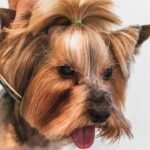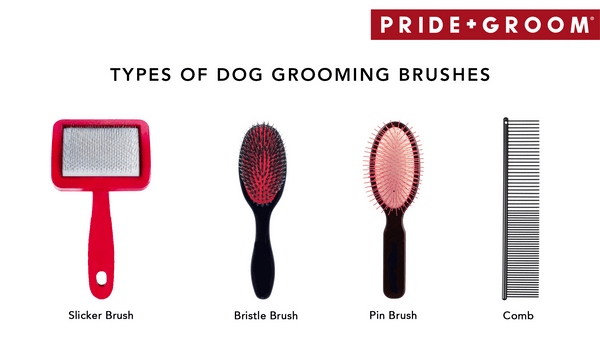
Welcome to “Best Grooming Tools for Long-Haired Breeds,” where you’ll discover the top products to help keep your furry friend’s coat healthy, shiny, and tangle-free. Whether you’re a seasoned dog owner or new to the world of long-haired breeds, the right grooming tools can make a world of difference in maintaining your dog’s overall health and well-being. From brushes and combs designed specifically for long and flowing coats to shampoos that support healthy skin, we’ve got the essentials to help you care for your canine companion. Dive in and find the best grooming tools that veterinarians and pet health experts recommend for keeping your long-haired breed looking and feeling their absolute best. Have you ever wondered what the best grooming tools are for your long-haired dog? If you’re a proud owner of a long-haired breed, you know that maintaining their luscious coat can be both a joy and a challenge. Grooming isn’t just about keeping your dog looking good; it’s crucial for their health and well-being too.
Understanding Long-Haired Breeds
Before diving into the best grooming tools, let’s understand what makes long-haired breeds unique. These breeds, such as Shih Tzus, Afghan Hounds, and Golden Retrievers, have longer, thicker fur that requires regular upkeep. Their coat can tangle easily, and if not groomed properly, can lead to skin issues and discomfort for your furry friend.
The Importance of Regular Grooming
Regular grooming helps prevent matting, reduces shedding, and keeps your dog’s skin healthy. It also provides an opportunity to check for any abnormalities such as lumps, parasites, or skin conditions.
Health Benefits of Grooming
Grooming has numerous health benefits. It stimulates blood circulation, promotes a shiny coat, and can improve your dog’s mental state, making them feel comfortable and relaxed. Let’s explore the tools that make this all possible.
Essential Grooming Tools for Long-Haired Breeds
When it comes to grooming long-haired breeds, using the right tools can make all the difference. Here’s a comprehensive list of must-have grooming tools.
Slicker Brush
A slicker brush is essential for removing tangles and mats. It has fine, short wires close together and is designed to penetrate deep into the coat without scratching your dog’s skin.
Pin Brush
A pin brush is perfect for finishing and fluffing the coat. It’s less harsh than a slicker brush and is ideal for long, silky coats. The pins often have rounded tips to avoid damaging the skin.
Combs
Combs come in various tooth sizes and can be used for different parts of the grooming process. Fine-tooth combs are great for delicate areas like the face and feet, while wide-tooth combs can be used for detangling.
De-matting Tool
For dogs that often get mats, a de-matting tool is a lifesaver. These tools can break up and remove mats without pulling too much on your dog’s coat, making the grooming process less painful.
Shedding Tool
Long-haired breeds shed, and a shedding tool can help minimize the mess. These tools are designed to remove loose undercoat hair without damaging the topcoat.
Grooming Scissors and Thinning Shears
Scissors are useful for trimming around the face, paws, and other sensitive areas. Thinning shears help blend different coat lengths for a more natural look.
Nail Clippers
Long nails can be uncomfortable and unhealthy for your dog. Using nail clippers can help maintain a healthy nail length and prevent problems like split or broken nails.
Ear Cleaner
Long-haired breeds can be prone to ear infections, so keeping their ears clean is crucial. Using a vet-approved ear cleaner can help prevent infections and remove dirt and wax buildup.
Pet-Safe Shampoo and Conditioner
Long-haired breeds need regular baths to keep their coat clean and free of excess oils. Use a pet-safe shampoo and conditioner formulated for your dog’s specific coat type to maintain skin and fur health.
Table: Essential Grooming Tools Breakdown
| Tool | Purpose |
|---|---|
| Slicker Brush | Removes tangles and mats |
| Pin Brush | Finishing and fluffing the coat |
| Fine-Tooth Comb | Delicate areas like face and feet |
| Wide-Tooth Comb | Detangling larger areas |
| De-matting Tool | Breaks up mats without painful pulling |
| Shedding Tool | Removes loose undercoat hair |
| Grooming Scissors | Trims sensitive areas |
| Thinning Shears | Blends different coat lengths |
| Nail Clippers | Maintains healthy nail length |
| Ear Cleaner | Prevents ear infections |
| Pet-Safe Shampoo/Conditioner | Maintains clean and healthy coat |
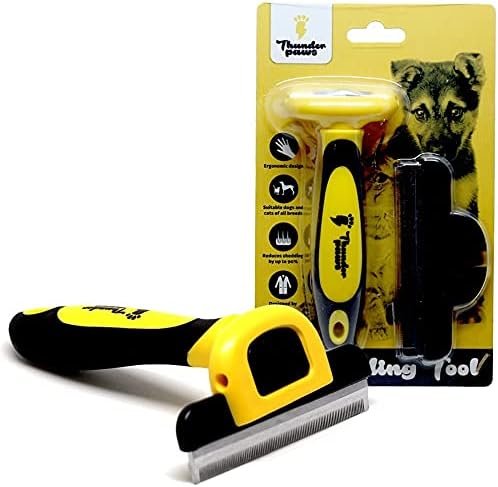
Grooming Tips for Long-Haired Breeds
Using the right tools is only part of the equation. Knowing how to use them effectively is just as important. Here are some tips to make grooming your long-haired breed easier and more efficient.
Start with a Brush
Always start by brushing your dog’s coat to remove any tangles or mats. Use a slicker brush initially, followed by a pin brush for a smoother finish. Regular brushing can prevent many of the issues that require more intensive grooming later on.
Bathe Regularly But Not Too Often
Bathing your dog keeps their coat clean, but bathing too often can strip the natural oils from their skin. Aim for a bath every 4-6 weeks, using a pet-safe shampoo and conditioner. After bathing, ensure your dog is thoroughly dried to prevent skin irritations.
Check for Mats
During brushing sessions, always check for mats, especially in areas where the fur tends to tangle like behind the ears, under the legs, and around the tail. Use a de-matting tool to gently break up these mats.
Use the Right Shampoo and Conditioner
Not all shampoos and conditioners are created equal. Choose products that are specially formulated for long-haired breeds or for any specific skin conditions your dog might have.
Trim the Coat
If your dog’s coat grows too long, consider trimming it to a manageable length. This is especially important in hot weather to keep your dog cool and comfortable. Use grooming scissors or thinning shears to do this. If you’re unsure, consult a professional groomer.
Clean the Ears
Long-haired breeds are prone to ear infections, so cleaning their ears regularly is essential. Use a vet-approved ear cleaner and be gentle to avoid hurting your dog. Regular ear cleaning can prevent infections and keep your dog comfortable.
Nail Maintenance
Long nails can cause discomfort and even joint issues in dogs. Trim your dog’s nails regularly using nail clippers. If you’re unsure how to do this, ask your vet or a professional groomer for advice.
Dental Health
Grooming isn’t just about the coat. Pay attention to your dog’s dental health too. Use canine toothbrushes and toothpaste to keep their teeth clean and their breath fresh. Regular dental care can prevent serious health issues down the road.
Health Supplements to Support Grooming
Just like humans, dogs benefit from a well-rounded diet and health supplements. These can improve their coat condition, joint health, and overall well-being.
Omega-3 Fatty Acids
Omega-3 fatty acids are crucial for maintaining a healthy coat and skin. They help reduce inflammation and can make the coat shinier and softer.
Glucosamine and Chondroitin
These supplements support joint health, which is particularly important for older dogs or breeds prone to joint issues. A dog in good health is less likely to become lethargic and more likely to enjoy regular grooming sessions.
Probiotics
Probiotics help maintain a healthy gut, which can impact skin and coat health. A balanced digestive system can lead to better nutrient absorption and a healthier coat.
Multivitamins
Multivitamins can fill any nutritional gaps in your dog’s diet, supporting overall health and wellness. These supplements can make a noticeable difference in your dog’s coat condition.
Table: Health Supplements to Consider
| Supplement | Benefits |
|---|---|
| Omega-3 Fatty Acids | Healthy skin and coat, reduces inflammation |
| Glucosamine/Chondroitin | Supports joint health |
| Probiotics | Maintains a healthy gut, improves nutrient absorption |
| Multivitamins | Fills nutritional gaps, supports overall wellness |
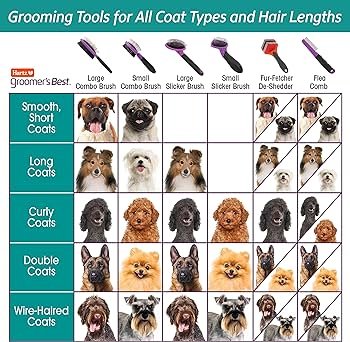
Consulting Your Veterinarian
Before starting any new grooming regimen or introducing new supplements, it’s crucial to consult your veterinarian. They can provide personalized advice based on your dog’s specific needs and health conditions.
Regular Check-Ups
Regular veterinary check-ups are essential. They can help catch any underlying issues that might be affecting your dog’s coat and skin health.
Vaccinations and Preventive Care
Keeping your dog up-to-date on vaccinations and preventive care is also important. Parasites and infections can affect your dog’s overall health and coat condition.
The Role of Professional Groomers
While you can do a lot at home, professional groomers have the training and tools to keep your dog in optimal condition. Regular visits to a professional groomer can make the home grooming process more manageable.
Choosing the Right Groomer
When choosing a groomer, look for experience with long-haired breeds. Check reviews and ask for recommendations to ensure your dog will be in good hands.
Regular Visits
Aim for professional grooming sessions every 6-8 weeks. This can vary based on your dog’s breed and individual needs. Professional groomers can handle more complex grooming tasks and provide advice on maintaining your dog’s coat at home.
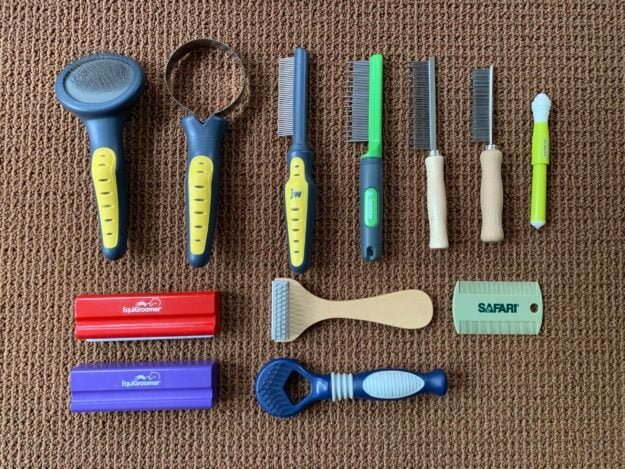
Final Thoughts
Grooming your long-haired breed doesn’t have to be a daunting task. With the right tools and knowledge, you can keep your dog’s coat in top condition. Regular grooming is essential for their health and well-being, and can be a bonding experience for both of you.
Remember, grooming isn’t just about aesthetics; it’s a vital part of your dog’s health care routine. Whether you tackle grooming at home or rely on the expertise of a professional groomer, your furry friend will benefit from the care and attention.
So, grab those grooming tools, schedule regular grooming sessions, and enjoy the happy, healthy company of your beautifully groomed long-haired canine companion!





